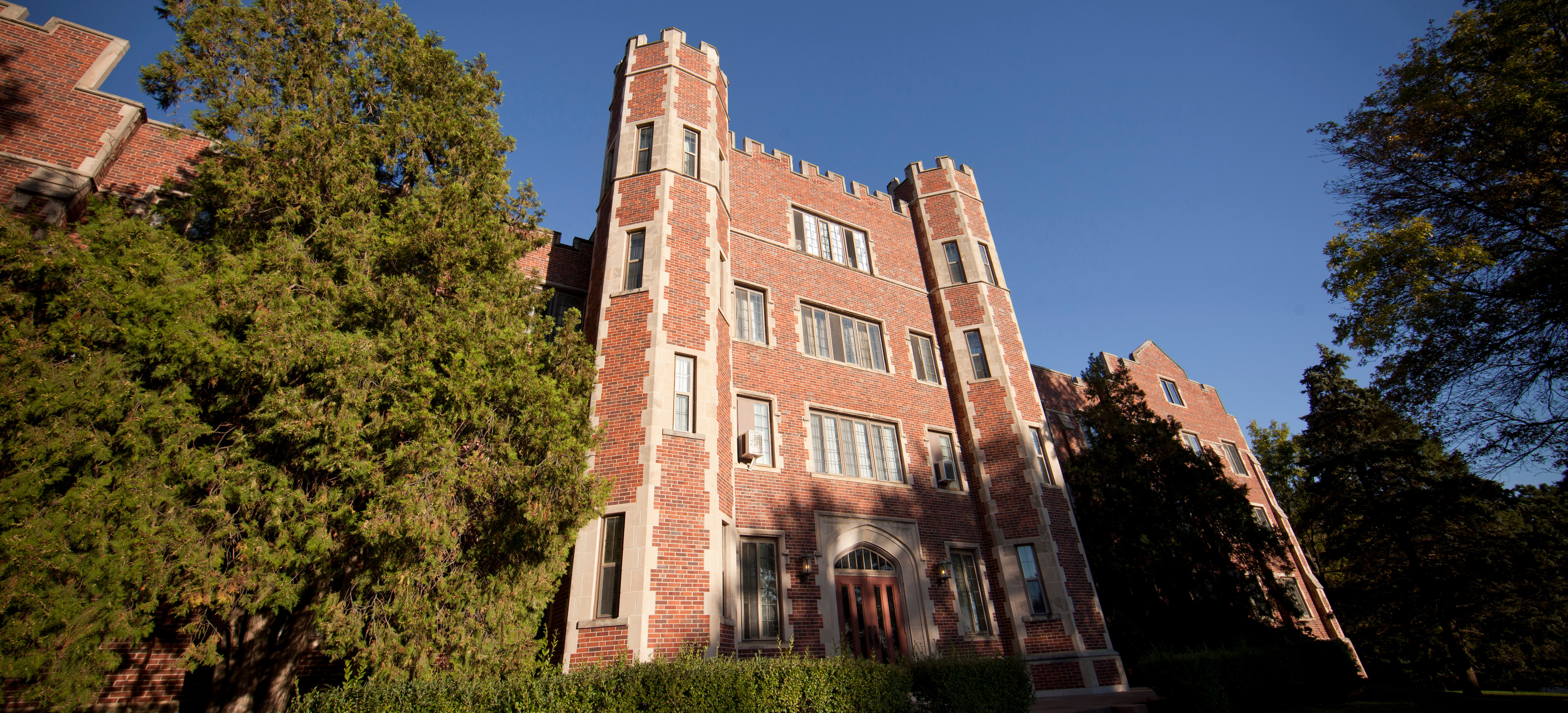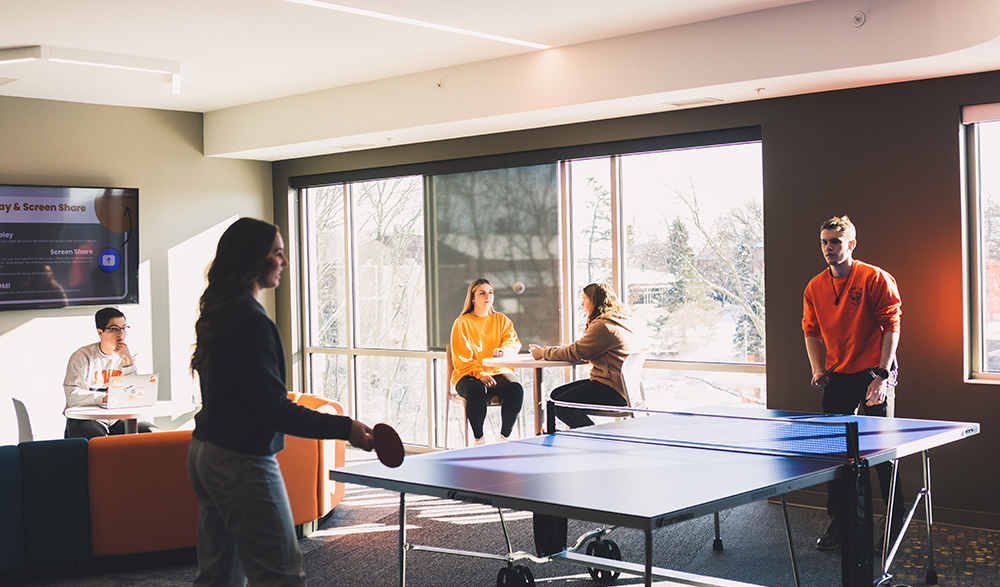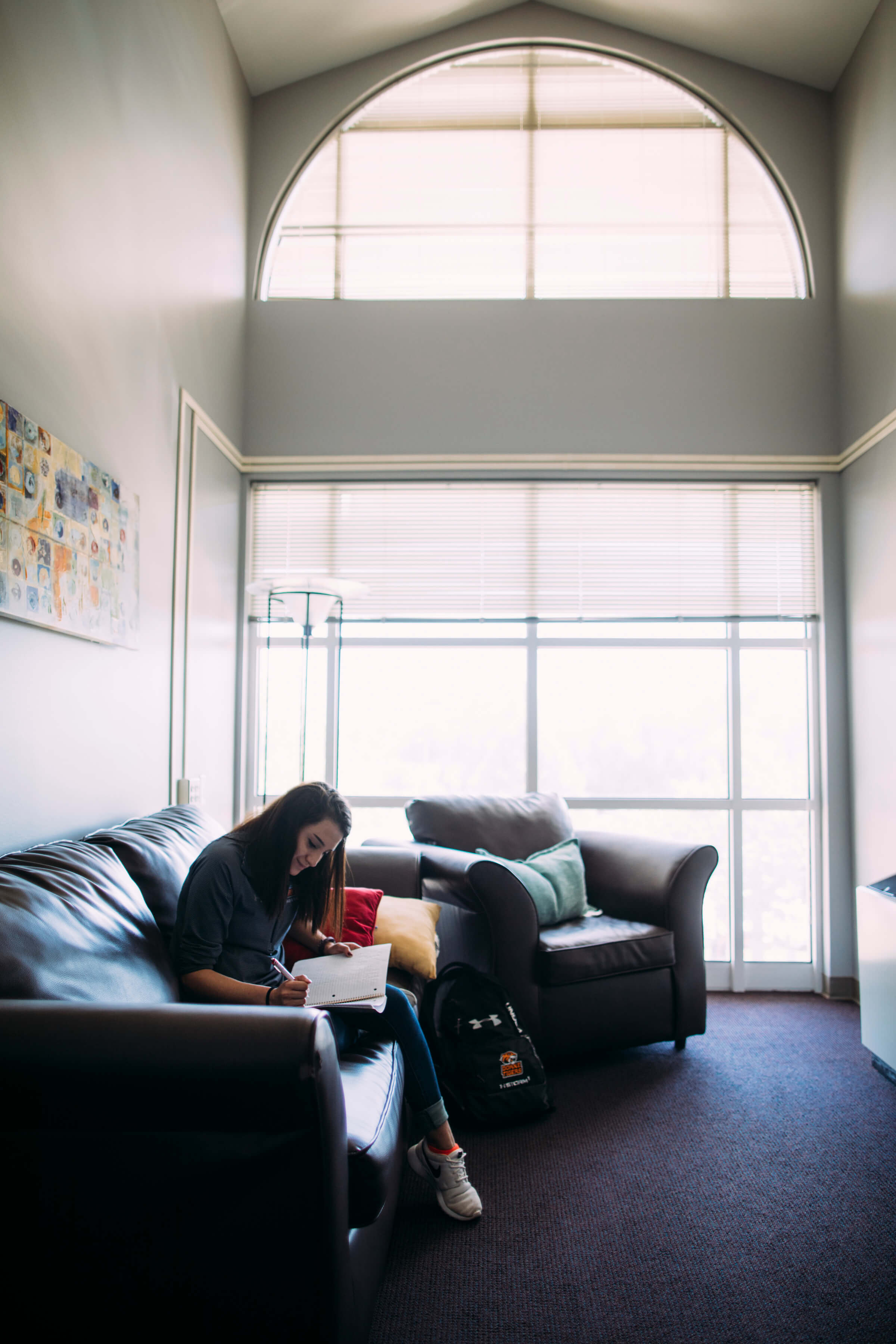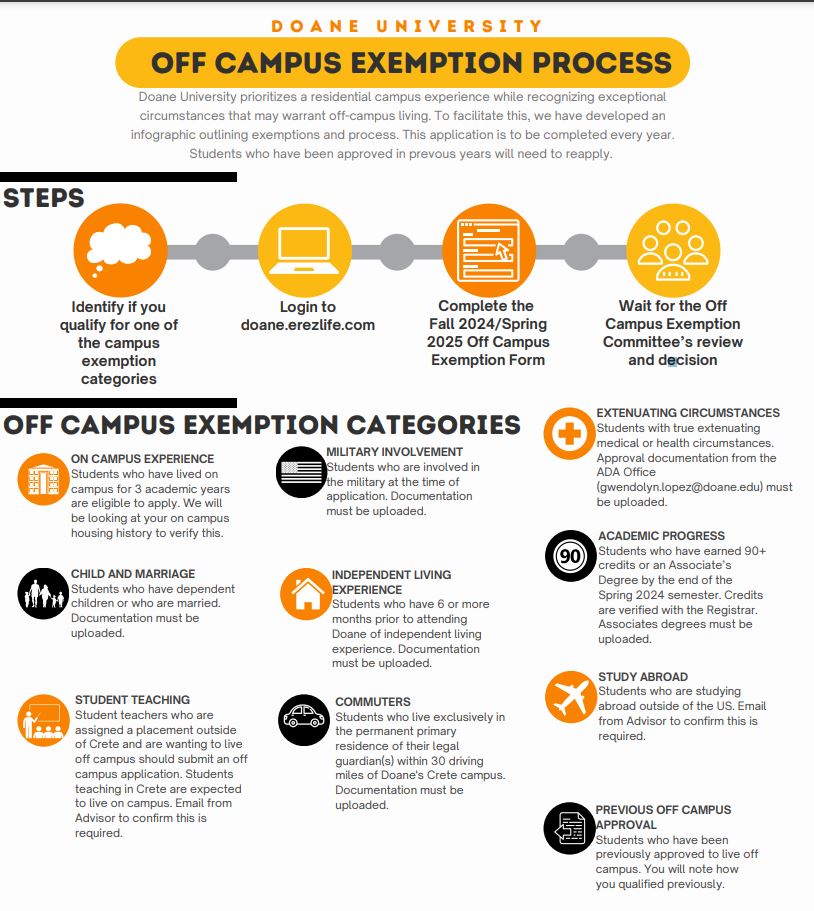
Enjoy Premier University Housing and Dining at Doane
Settle Into Community
When you make Doane your home, you don’t just move into a building, you join a community whose purpose is to help you thrive so you can make an impact in the classroom and beyond.

Planning for Residence Hall Move In
We are excited to welcome you to campus. Move-In day is an exciting day for you, family, friends and for the community. Room assignments are mailed out each summer. Once you receive the letter, you should contact your roommate and coordinate what each of you will bring.
When choosing what to bring to campus, focus on safety and space. Suite and traditional residence halls rooms come with the necessary furniture, but we understand that you may want to add some amenities to that. You are welcome to do so within the following guidelines:
Please note, appliances listed must have an automatic shut off feature. All permitted appliances must have UL branded electric cords, including power strips.
- TV
- Gaming consoles
- Stereo/speakers
- Coffee machine
- Electric water/tea kettle
- Candle warmer
- Blender
- Fans
- Crockpot
- Futon
- Air Fryer (cannot be 2-in-1 option)
- Lava lamp
- Bean bag
- Hot plate
- Candles (you can cut the wick and use on a candle warmer, no open flames)
- Electric skillet
- Toaster oven/toaster
- Large permanent furniture pieces
- George Foreman grill
- Ice machine
- Heated/electric blanket
- Extension cord
- Plugging power strips into each other
- Microwave (all rooms have)
- Refrigerators (all rooms have)
- Any other high-energy appliance, such as space heaters or air conditioners
When decorating, keep in mind potential damage and fire safety. We want your space to reflect you, within the following guidelines:
- No nails, tacks or tape. Only use Command Strips.
Door decorating:
- Nothing that covers peepholes.
- Items that protrude past the door frame.
- Tape and other hanging materials that will damage the door.
- No live trees. Small plants are allowed, such as succulents.
- No halogen bulbs.
- No LED string lights hung with self-adhesive, 3M hooks or Command Strips can be used – avoid paint damage.
- No spray-on decorations, such as spray-on snow.
- No paraphernalia related to drugs that are illegal in the state of Nebraska.
- Alarm clock
- Laundry basket, detergent
- Bedding
- Pillows and extra-long twin sheets
- Shower tote and sandals
- Personal hygiene items
- Message or marker board
- 3M or another removable tape
- School supplies
- Pictures of friends and family
- Flashlight and batteries
- Eating utensils (Cups, Bowls, Forks, Spoons)
Extra Items
- Personal computer
- Dehumidifier
- Floor rug
- Lamp
- Storage containers
- Drawer organizer
- Over-the-door hooks or hangers
- Iron and ironing board
- Water pitcher
- Basic food such as Easy-Mac, ramen, etc.
- Chip clips
- Can opener
- Hand vacuum and cleaning wipes
- Mirror
- Kleenex and napkins
- Air freshener
- Basic first aid kit
- Umbrella
- Safety bed rail
Please note, appliances listed must have an automatic shut off feature. All permitted appliances must have UL branded electric cords, including power strips.
- TV
- Gaming consoles
- Stereo/speakers
- Coffee machine
- Electric water/tea kettle
- Candle warmer
- Blender
- Fans
- Crockpot
- Futon
- Air Fryer (cannot be 2-in-1 option)
- Lava lamp
- Bean bag
- Hot plate
- Candles (you can cut the wick and use on a candle warmer, no open flames)
- Electric skillet
- Toaster oven/toaster
- Large permanent furniture pieces
- George Foreman grill
- Ice machine
- Heated/electric blanket
- Extension cord
- Plugging power strips into each other
- Microwave (all rooms have)
- Refrigerators (all rooms have)
- Any other high-energy appliance, such as space heaters or air conditioners
When decorating, keep in mind potential damage and fire safety. We want your space to reflect you, within the following guidelines:
- No nails, tacks or tape. Only use Command Strips.
Door decorating:
- Nothing that covers peepholes.
- Items that protrude past the door frame.
- Tape and other hanging materials that will damage the door.
- No live trees. Small plants are allowed, such as succulents.
- No halogen bulbs.
- No LED string lights hung with self-adhesive, 3M hooks or Command Strips can be used – avoid paint damage.
- No spray-on decorations, such as spray-on snow.
- No paraphernalia related to drugs that are illegal in the state of Nebraska.
- Alarm clock
- Laundry basket, detergent
- Bedding
- Pillows and extra-long twin sheets
- Shower tote and sandals
- Personal hygiene items
- Message or marker board
- 3M or another removable tape
- School supplies
- Pictures of friends and family
- Flashlight and batteries
- Eating utensils (Cups, Bowls, Forks, Spoons)
Extra Items
- Personal computer
- Dehumidifier
- Floor rug
- Lamp
- Storage containers
- Drawer organizer
- Over-the-door hooks or hangers
- Iron and ironing board
- Water pitcher
- Basic food such as Easy-Mac, ramen, etc.
- Chip clips
- Can opener
- Hand vacuum and cleaning wipes
- Mirror
- Kleenex and napkins
- Air freshener
- Basic first aid kit
- Umbrella
- Safety bed rail

New Tiger – FAQs
Do I have to live on campus?
Doane's Crete campus is residential, meaning students are required to live on campus in university housing all four years unless they meet exception criteria that permit them to move off campus. Only the Office of Residential Life and Education can grant off-campus approval.
Can I visit campus this summer and take a look at my specific room?
Unfortunately, no. During the summer Residence Halls are used for camps, conferences and summer housing.
What is a Resident Room Condition Report and insurance coverage?
To safeguard both you and the University's facilities, our Residential Life team conducts pre- and post-move Resident Room Condition Reports. You are required to review and confirm the condition of each item in your room on doane.erezlife.com, noting any discrepancies after move-in. Document existing conditions during move-in to avoid potential charges at the year's end. Changes to the checkout condition may result in charges to your student account. Your active participation ensures the security and upkeep of our shared living spaces.
The University does not provide insurance for your property. We urge each student to purchase some form of insurance, whether it be renter's insurance or a rider on their parent's homeowner's insurance. The University is not liable for theft, damage or loss of personal property from any part of the residence hall.
Can I have a private room or change roommates?
Private rooms are double rooms that are purchased at a higher price for one person to reside in. Private rooms are rare and are only available if space permits. First-year and new students are typically unable to have private rooms.
While we strive to make the best matches possible, sometimes conflicts will arise. Residential Life views conflict as a healthy part of development. If roommate conflicts arise, the Residential Life team will assist with a mediation process to help parties involved find a solution that works for them.
Can I stay on campus during a break or leave my items?
The campus closes for Thanksgiving, Winter and Spring Breaks. Requests for exceptions are reviewed for each break. The campus is open for Fall Break, but we do ask you to complete a registration form so we are aware of who will be sticking around.
Students can keep their belongings within their space for the duration of the school year.
What is the cost of laundry?
Laundry is free for all on-campus students. Please make sure you bring your own laundry supplies. As per our laundry machine provider, we ask you, DO NOT use any form of pod detergent. These cause machines to get clogged and not work properly.
Are pets/ emotional support animal permitted in the Residence Halls?
Just fish. Students are permitted to have one 10-gallon aquarium per room.
If you are a student in University Housing with a disability and wish to pursue permission to bring an emotional support animal to campus, please begin this process by contacting Gwendolyn Lopez in the Office of Disability Services. Our Emotional Support Animal page has more information.
Is alcohol permitted in the Residence Halls?
Residents who are 21 or older can apply to have an alcohol-tolerant room if everyone in that room is of age. Upon approval from the Director of Health & Wellness, alcohol-tolerant rooms may have beer and wine. Hard liquor is never permitted on campus.
What is my mailing address?
Each student has their own mailbox.
How to Address Student Mail:
Student's Name
Doane University
1014 Boswell Ave.
Ste: (This will be your individual mailbox number)
Crete, NE 68333
Fuel your day, your way.
You have a variety of options to keep you energized and ready to tackle your day. Whether you need a bite on the go or have time to sit down for a meal, we’ve got your bases covered.
Dining Options
- The main dining hall, or “The Caf”, serves varied menus each week in a traditional dining atmosphere. Choose from a variety of meal plan options.
- Crunched for time? The Tiger Den. Offers on-the-go menu items such as grilled sandwiches, chicken strips, burgers, drinks, chips, fresh salads and wraps.
- Lakeside Coffee Shop features Starbucks coffee for your morning or afternoon pick-me-up. If coffee isn’t your thing, enjoy smoothies, energy drinks, teas, pastries, and other snacks.
- View hours and menus.
Already Accepted to Doane
Step 1 – Find your acceptance email and confirm you have set up your student account.
Step 2 - Visit our Resident Life portal
Step 3 - Complete your profile
Step 4 – Complete your housing application
Step 5 - Looking for a roommate? Complete your RoomeeZ profile and turn it on, so others can view your profile.
Qualify to live off campus?
Check out the Off Campus Exemption Process guide with how to start that process.

When students start at Doane University, they have the chance to try out different classes and activities. For example, Sarah is a freshman who takes psychology, world history, environmental science, and a painting class. She also joins theatre and forensics. By trying different things, Sarah gets a better understanding of the world and discovers new interests and skills. Sarah’s roommate, Emma, invites her to a Biology Club event, linking what she’s learning in environmental science with biology. This helps Sarah see how different subjects connect, which deepens her understanding of both. Exploring different subjects helps students become well-rounded individuals with a mix of knowledge and skills that can open up more job opportunities in the future.
Students learn how to connect ideas from different classes. In her sophomore year, Sarah takes psychology and creative writing. She creates a story that includes what she’s learned about how the brain works. By linking psychology and writing, Sarah makes something unique and interesting. Sarah discusses her project with friends from other majors in her hall in the study room. They give her new ideas and help improve her story. Working together with others helps students think in new ways and build strong connections, both in school and later in careers. Employers value people who can think creatively and solve problems by combining ideas from different areas. This skill can make Doane students stand out in the job market.
By the time students are seniors, they're ready to use everything they've learned to tackle real-world problems. For her capstone project, Sarah creates a mental health program for students using her knowledge from psychology, environmental science and painting. Her program includes outdoor activities, art therapy and brain exercises to help reduce stress on campus. Sarah works with the Residence Life team/Community Advisors to put her program into action. She leads art therapy sessions and nature walks, making a positive impact on her fellow students. This experience shows how students can use their skills to help others, something that’s highly valued by employers. Employers want people who can turn ideas into action. Being able to apply what you’ve learned to real-life situations shows that a student is prepared for the workforce.
When students start at Doane University, they have the chance to try out different classes and activities. For example, Sarah is a freshman who takes psychology, world history, environmental science, and a painting class. She also joins theatre and forensics. By trying different things, Sarah gets a better understanding of the world and discovers new interests and skills. Sarah’s roommate, Emma, invites her to a Biology Club event, linking what she’s learning in environmental science with biology. This helps Sarah see how different subjects connect, which deepens her understanding of both. Exploring different subjects helps students become well-rounded individuals with a mix of knowledge and skills that can open up more job opportunities in the future.
Students learn how to connect ideas from different classes. In her sophomore year, Sarah takes psychology and creative writing. She creates a story that includes what she’s learned about how the brain works. By linking psychology and writing, Sarah makes something unique and interesting. Sarah discusses her project with friends from other majors in her hall in the study room. They give her new ideas and help improve her story. Working together with others helps students think in new ways and build strong connections, both in school and later in careers. Employers value people who can think creatively and solve problems by combining ideas from different areas. This skill can make Doane students stand out in the job market.
By the time students are seniors, they're ready to use everything they've learned to tackle real-world problems. For her capstone project, Sarah creates a mental health program for students using her knowledge from psychology, environmental science and painting. Her program includes outdoor activities, art therapy and brain exercises to help reduce stress on campus. Sarah works with the Residence Life team/Community Advisors to put her program into action. She leads art therapy sessions and nature walks, making a positive impact on her fellow students. This experience shows how students can use their skills to help others, something that’s highly valued by employers. Employers want people who can turn ideas into action. Being able to apply what you’ve learned to real-life situations shows that a student is prepared for the workforce.
